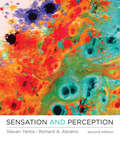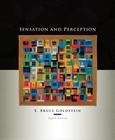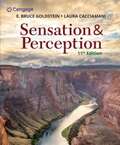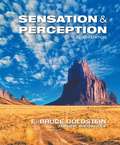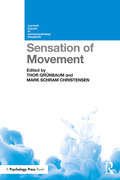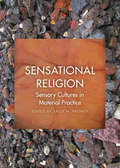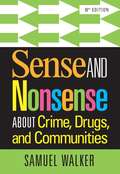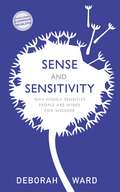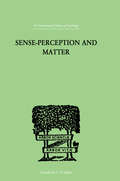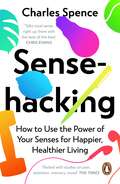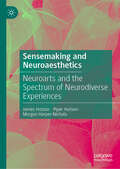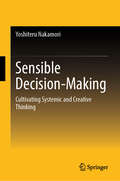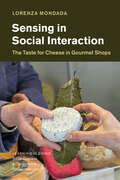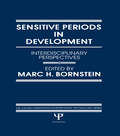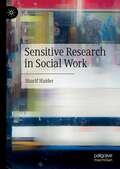- Table View
- List View
Sensation and Perception
by Richard A. Abrams Steven YantisLike no other text, Sensation and Perception expertly introduces students to how we sense and perceive the world around us. Using clear and detailed explanations and highly effective illustrations the text illuminates the connections between mind, brain, and behavior in the realm of sensation and perception. Seamlessly integrating classic findings with cutting edge research in psychology, physiology and neuroscience Sensation and Perception 2e explores what questions researchers are seeking to answer to today and the methods of investigation they are using.Sensation and Perception, Second Edition, now includes 15 chapters, including separate chapters on motion perception, perception for action, olfaction, and gustation, and a new appendix on noise and signal detection theory The new edition introduces new coauthor Richard A. Abrams (Washington University).
Sensation and Perception
by Steven Yantis Richard AbramsLike no other text, Sensation and Perception expertly introduces students to how we sense and perceive the world around us. Using clear and detailed explanations and highly effective illustrations the text illuminates the connections between mind, brain, and behavior in the realm of sensation and perception. Seamlessly integrating classic findings with cutting edge research in psychology, physiology and neuroscience Sensation and Perception 2e explores what questions researchers are seeking to answer to today and the methods of investigation they are using.Sensation and Perception, Second Edition, now includes 15 chapters, including separate chapters on motion perception, perception for action, olfaction, and gustation, and a new appendix on noise and signal detection theory The new edition introduces new coauthor Richard A. Abrams (Washington University).
Sensation and Perception (Eighth Edition)
by E. Bruce GoldsteinSeeing and reading this sentence may seem like a "no brainer"--but your perception is just a tiny part of what is happening in your brain and body right now (both are much busier than you might think). SENSATION AND PERCEPTION has helped many students like you understand the ties between how we sense the world and how the body interprets these senses. A key strength of this text has always been the ability to illustrate concepts through examples and visuals. Dr. Goldstein walks you through an intriguing journey of the senses, combining clear writing, his extensive classroom experience, and innovative research to create a visual, colorful text. Complemented by nearly 500 illustrations and photographs, this text has also been sharpened to make it more readable than ever, based on feedback from 2,000 student users. The accompanying VIRTUAL LAB media exercises (available on CD-ROM and online) offer a wide array of interactive animations and examples designed to stimulate your understanding of difficult concepts.
Sensation and Perception (Mindtap Course List Series)
by E. Bruce Goldstein Laura CacciamaniPacked with captivating examples and visuals, Goldstein/Cacciamani's SENSATION AND PERCEPTION, 11e, gives students a thorough understanding of perceptual research and how the results of this research relate to everyday experiences. The authors take students on an intriguing journey through the senses with both clarity and thoroughness, combining their extensive classroom experience with innovative research to create a visual, colorful text. <p><p>Reflecting the latest developments from the field, the 11th edition has been thoroughly updated with cutting-edge research, while 85 new full-color figures bring chapter concepts to life. The Exploration feature in MindTap—the digital learning solution that equips students with anywhere, anytime learning tools—deepens comprehension by allowing students to view experimental stimuli, perceptual demonstrations and short film clips about research being discussed.
Sensation and Perception (Mindtap for Psychology)
by E. Goldstein James BrockmoleE. Bruce Goldstein's SENSATION AND PERCEPTION has helped a myriad of students understand perceptual research and how the results of this research relate to everyday experience. A key strength of this text has always been its ability to illustrate concepts through examples and visuals. Dr. Goldstein and new co-author Dr. James Brockmole take students on an intriguing journey through the senses with both clarity and thoroughness, combining their extensive classroom experience and the most innovative research to create a visual, colorful text.
Sensation and Perception (Third Edition)
by Jeremy M. Wolfe Keith R. Kluender Dennis M. Levi Linda M. Bartoshuk Rachel S. Herz Roberta Klatzky Susan J. Lederman Daniel M. MerfeldThe book provides comprehensive descriptions of the science behind vision, hearing, touch, smell and taste.
Sensation and Perception, 2nd Edition
by Richard A. Abrams Steven YantisLike no other text, Sensation and Perception expertly introduces students to how we sense and perceive the world around us. Using clear and detailed explanations and highly effective illustrations the text illuminates the connections between mind, brain, and behavior in the realm of sensation and perception. Seamlessly integrating classic findings with cutting edge research in psychology, physiology and neuroscience Sensation and Perception 2e explores what questions researchers are seeking to answer to today and the methods of investigation they are using. Sensation and Perception, Second Edition, now includes 15 chapters, including separate chapters on motion perception, perception for action, olfaction, and gustation, and a new appendix on noise and signal detection theory The new edition introduces new coauthor Richard A. Abrams (Washington University).
Sensation of Movement (Current Issues in Consciousness Research)
by Mark Christensen Thor GrünbaumSensation of Movement explores the role of sensation in motor control, bodily self-recognition and sense of agency. The sensation of movement is dependent on a range of information received by the brain, from signalling in the peripheral sensory organs to the establishment of higher order goals. Through the integration of neuroscientific knowledge with psychological and philosophical perspectives, this book questions whether one type of information is more relevant for the ability to sense and control movement. Addressing conscious sensations of movement, experimental designs and measures, and the possible functions of proprioceptive and kinaesthetic information in motor control and bodily cognition, the book advocates the integration of neuroscientific knowledge and philosophical perspectives. With an awareness of the diverse ideas and theories from these distinct fields, the book brings together leading researchers to bridge these divides and lay the groundwork for future research. Of interest to both students and researchers of consciousness, Sensation of Movement will be essential reading for those researching motor control, multimodal perception, bodily self-recognition, and sense of agency. It aims to encourage the integration of multiple perspectives in order to arrive at new insights into how sensation of movement can be studied scientifically.
Sensational Flesh: Race, Power, and Masochism (Secular Studies #43)
by Amber Jamilla MusserThis &“lively and enlightening contribution to queer studies&” investigates power, race, and gender through the lens of masochism (Darieck Scott, author of Extravagant Abjection). In everyday language, masochism is usually understood as the desire to abdicate control in exchange for sensation—pleasure, pain, or a combination thereof. Yet at its core, masochism is a site where power, bodies, and society come together. Drawing on rich and varied sources—from nineteenth century sexology, psychoanalysis, and critical theory to literary texts and performance art—Amber Jamilla Musser employs masochism as a diagnostic tool for probing relationships between power and subjectivity. Engaging with a range of debates about lesbian S&M, racialization, femininity, and disability, as well as key texts such as Sacher-Masoch&’s Venus in Furs, Pauline Réage&’s The Story of O, and Michel Foucault's History of Sexuality, Musser renders legible the complex ways that masochism has been taken up by queer, feminist, and critical race theories. Furthering queer theory&’s investment in affect and materiality, she proposes &“sensation&” as an analytical tool for illustrating what it feels like to be embedded in structures of domination such as patriarchy, colonialism, and racism—as well as what it means to embody femininity, blackness, and pain. Sensational Flesh is ultimately about how difference is made material through race, gender, and sexuality and how that materiality is experienced.
Sensational Religion
by Sally PromeyThe result of a collaborative, multiyear project, this groundbreaking book explores the interpretive worlds that inform religious practice and derive from sensory phenomena. Under the rubric of "making sense," the studies assembled here ask, How have people used and valued sensory data? How have they shaped their material and immaterial worlds to encourage or discourage certain kinds or patterns of sensory experience? How have they framed the sensual capacities of images and objects to license a range of behaviors, including iconoclasm, censorship, and accusations of blasphemy or sacrilege? Exposing the dematerialization of religion embedded in secularization theory, editor Sally Promey proposes a fundamental reorientation in understanding the personal, social, political, and cultural work accomplished in religion's sensory and material practice. Sensational Religion refocuses scholarly attention on the robust material entanglements often discounted by modernity's metaphysic and on their inextricable connections to human bodies, behaviors, affects, and beliefs.
Sense and Nonsense About Crime, Drugs, and Communities
by Samuel WalkerSamuel Walker's SENSE AND NONSENSE ABOUT CRIME, DRUGS, AND COMMUNITIES was one of the first books to challenge common misconceptions about crime, and the new Eighth Edition remains uniquely effective at doing so. Described as a masterful critique of American policies on everything from crime control, to guns, to drugs, this incisive text cuts through popular myths and political rhetoric to confront both conservative and liberal propositions in the context of current research and proven practice. The result is a lucid, research-based work that stimulates critical thinking and enlivens class discussions. This engaging text captures the full complexity of the administration of justice while providing students with a clear sense of its key principles and general patterns.
Sense and Sensitivity: Why Highly Sensitive People Are Wired for Wonder
by Deborah Ward"If you're an HSP, Deborah Ward is the friend who finally 'gets' it..." - Jenn Granneman, co-founder of HighlySensitiveRefuge.com, author of The Secret Lives of IntrovertsAre you a Highly Sensitive Person? If so, you probably find the world to be an overwhelming place. You may struggle with loud, bright or busy situations; your senses are frequently over-stimulated, and you may be a true empath, feeling the pain of others deeply, putting the needs of those around you above your own.In this blend of memoir, scientific research and practical guide, Deborah Ward - author of the popular blog 'Sense and Sensitivity' (Psychology Today) - shares her journey as an HSP from childhood to adulthood. Through her experiences with over-stimulation, work, socializing, relationships and self-discovery, she uncovers the joys of sensitivity, including intellectual curiosity, empathy, compassion and creativity. Each chapter includes a list of practical suggestions that will inform, console, reassure and inspire you, helping you to better understand who you are and what you need to thrive as an HSP.It is not your destiny to live quietly, hiding in fear; nor is it your duty to try to act like everyone else. Being highly sensitive can be challenging, but it is also a gift; it is your gift.
Sense and Sensitivity: Why Highly Sensitive People Are Wired for Wonder
by Deborah Ward"If you're an HSP, Deborah Ward is the friend who finally 'gets' it..." - Jenn Granneman, co-founder of HighlySensitiveRefuge.com, author of The Secret Lives of IntrovertsAre you a Highly Sensitive Person? If so, you probably find the world to be an overwhelming place. You may struggle with loud, bright or busy situations; your senses are frequently over-stimulated, and you may be a true empath, feeling the pain of others deeply, putting the needs of those around you above your own.In this blend of memoir, scientific research and practical guide, Deborah Ward - author of the popular blog 'Sense and Sensitivity' (Psychology Today) - shares her journey as an HSP from childhood to adulthood. Through her experiences with over-stimulation, work, socializing, relationships and self-discovery, she uncovers the joys of sensitivity, including intellectual curiosity, empathy, compassion and creativity. Each chapter includes a list of practical suggestions that will inform, console, reassure and inspire you, helping you to better understand who you are and what you need to thrive as an HSP.It is not your destiny to live quietly, hiding in fear; nor is it your duty to try to act like everyone else. Being highly sensitive can be challenging, but it is also a gift; it is your gift.
Sense-Perception And Matter: A CRITICAL ANALYSIS OF C D BROAD'S THEORY OF PERCEPTION (International Library Of Psychology Ser.)
by Lean, MartinFirst published in 1999. Routledge is an imprint of Taylor & Francis, an informa company.
Sense-making: Problematizing Constructs of Literacy for 21st Century Education (SpringerBriefs in Education)
by Marilyn J. Narey Kelli Jo Kerry-MoranThis book is a rich, yet highly accessible volume that details an exciting and much-needed inquiry into the notion of literacy: what it is, why it is, and how it might be framed most effectively for 21st century education. The chapters unfold in a creative interplay of practice and theory. Narey’s insightful questioning into the socio-historical-cultural implications of “literacy as empowerment” establishes the critical context, while Kerry-Moran’s examination of the burgeoning literacy landscape reveals challenges for teacher education. Drawing upon classic and cutting-edge theories, Narey builds a provocative and powerful case for a 21st century construct of literacy as sense-making: sense as relative to the senses (i.e., sight, hearing) and sense as making meaning. Her innovative model of the literacy event opens up a range of potential foci for analysis and facilitates her teasing out of two critical areas for instruction: sensory perception and aesthetic knowledge. This theoretical sense-making lens is applied to Kerry-Moran’s teacher education classroom as the authors reflect upon further development. As a timely original and thought-provoking work, this slim volume of big ideas promises to be a valuable resource for teacher educators and other scholars who seek a clear and cohesive frame for literacy in 21st century education. This is a very well written scholarly text that provides a new and important theory of 21st century literacy. Narey’s sketches of literacy as sense-making are laid out in logical form, building upon researched and referenced sources to ground her ideas and offering the reader information, examples and new insights. In addition to providing many significant perspectives underpinning her new theory, Narey provides excellent historical and current explanations about literacy from highly respected researchers in the field. The inclusion of a practical application of Narey’s conceptual/theoretical framework to Kerry-Moran's example of an instructional unit in a teacher education course is helpful to understanding the theory in practice. The references throughout the work are extensive, comprehensive and very well documented. This text, Sense-making: Problematizing Constructs of Literacy for 21st Century Education, contributes original thinking to the field of literacy and learning and would be an excellent resource for literacy and language professors or instructors in a post-graduate or professional development program.Penny Silvers, Professor of Education, Dominican University, USA
Sensehacking: How to Use the Power of Your Senses for Happier, Healthier Living
by Charles SpenceThe world expert in multisensory perception on the remarkable ways we can use our senses to lead richer lives 'Talks total sense, lots of fun facts, right up there with the best of the best' Chris Evans'Packed with studies on pain, attention, memory, mood' The Times How can the furniture in your home affect your wellbeing? What colour clothing will help you play sport better? And what simple trick will calm you after a tense day at work? In this revelatory book, pioneering and entertaining Oxford professor Charles Spence shows how our senses change how we think and feel, and how by 'hacking' them we can reduce stress, become more productive and be happier.We like to think of ourselves as rational beings, and yet it's the scent of expensive face cream that removes wrinkles (temporarily), a room actually feels warmer if you use a warmer paint colour, and the noise of the crowd really does affect the referee's decision. Understanding how our senses interact can produce incredible results. This is popular science at its unbelievable best. 'Spence does for the senses what Marie Kondo does for homes' Avery Gilbert, author of What the Nose Knows 'Everything you need to know about how to cope with the hidden sensory overload of modern life, engagingly told' Robin Dunbar, author of How Many Friends Does One Person Need?
Sensemaking and Neuroaesthetics: Neuroarts and the Spectrum of Neurodiverse Experiences
by James Hutson Piper Hutson Morgan Harper-NicholsThis book investigates the complex interrelationships between neuroscience, arts, technical design, and the spectrum of neurodivergent conditions, introducing the emerging topic of neuroarts. It emphasizes the power of art and technologies as a multisensory tool for helping neurodivergent individuals discover their sensory preferences, and for neurotypical individuals to broaden their understanding of the world by simulating different sensory experiences. Drawing on the enactivism theory, which posits that cognitive processes are inherently shaped through the dynamic interplay between an organism and its environmental context, the authors discuss the applications of emerging technologies and propose a new theory to discuss and identify ‘neurotribes’ based on their relation to sense making or the body.A timely and well-needed resource for scholars in the fields of neuroaesthetics and neurodiversity, as well as art therapists, clinical psychologists, and medical practitioners specializing in neurodiversity and sensory perception disorders, this book can also serve cultural institutions developing inclusive experiences for a neurodiverse public, and professionals in the tech industry focusing on AI, augmented reality, and sensory technology.
Sensemaking in Safety Critical and Complex Situations: Human Factors and Design
by Stig Ole Johnsen Thomas PoratheSensemaking in Safety Critical and Complex Situations: Human Factors and Design Human factors-based design that supports the strengths and weaknesses of humans are often missed during the concept and design of complex technical systems. With the focus on digitalization and automation, the human actor is often left out of the loop but needs to step in during safety-critical situations. This book describes how human factors and sensemaking can be used as part of the concept and design of safety critical systems in order to improve safety and resilience. This book discusses the challenges of automation and automated systems when humans are left out of the loop and then need to intervene when the situation calls for it. It covers human control and accepts that humans must handle the unexpected and describes methods to support this. It is based on recent accident analysis involving autonomous systems that move our understanding forward and supports a more modern view on human errors to improve safety in industries such as shipping and marine. The book is for human factors and ergonomists, safety engineers, designers involved in safety critical work and students. Stig Ole Johnsen is a Senior Researcher at SINTEF in Norway. He has a PhD from NTNU in Norway with a focus on resilience in complex socio-technical systems and has a Master’s in Technology Management from MIT/NTNU. He chairs the Human Factors in Control network (HFC) in Norway to strengthen the human factors focus during development and implementation of safety critical technology. His research interests include meaningful human control to support safety and resilience during automation and digitalization. Thomas Porathe has a degree in Information Design from Malardalen University in Sweden. He is currently Professor of Interaction Design at the Norwegian University of Science and Technology in Trondheim, Norway. He specializes in maritime human factors and design of maritime information systems, specifically directed towards control room design, e-navigation and autonomous ships. He has been working with e-Navigation since 2006 in EU projects such as BLAST, EfficienSea, MONALISA, ACCSEAS, SESAME and the unmanned ship project MUNIN. He is active in the International Association of Aids to Navigation and Lighthouse Authorities (IALA).
Sensibilidad emocional y cómo superarla: La sofistería no debe dominarte
by Danilo H. GomesLos hombres y mujeres emocionalmente sensibles generalmente no son comprendidos por la sociedad. Los hipersensibles son considerados débiles por los ignorantes cuando, en realidad, son extremadamente fuertes. Aunque las emociones son tan fuertes como un tren desbocado, pueden controlarse eliminando sofismas y conceptos erróneos. Además, cuando practicamos la autoconciencia, podemos identificar fácilmente patrones de pensamiento dañinos que deben eliminarse para frenar las emociones negativas. Este es el propósito de este libro. La obra “Sensibilidad emocional y cómo superarla”, escrita por alguien que sabe muy bien lo que es sufrir a manos de las emociones, conduce al lector por caminos profundos de la mente mientras desenmascara mentiras sobre la vida en sociedad y el ego. Rompe las ataduras emocionales y destruye los desencadenantes mentales que socavan tu alegría de vivir.
Sensible Decision-Making: Cultivating Systemic and Creative Thinking
by Yoshiteru NakamoriThis textbook challenges the limitations of traditional rational decision-making, arguing that it often fails to address complex, real-world problems. In today's data-driven, rapidly evolving world, decision-makers need a more comprehensive approach. Sensible Decision-Making offers a novel perspective, blending the rigor of logic with the flexibility of human intuition to unlock innovative solutions. While mathematical models provide elegant solutions to well-defined problems, they may not always capture the nuances of human thought and emotion. By integrating systemic and creative thinking, these limitations can be overcome. The knowledge triad synthesis framework, introduced in this book, synthesizes diverse rational, intuitive, and social knowledge sources to empower individuals to make more informed and effective decisions. The book begins by exploring traditional rational decision-making methods, including quantitative analysis of human factors. It then delves into well-established systemic and creative decision-making approaches. Finally, it introduces a novel synthetic decision-making method that reflects the author's innovative vision. Ultimately, this textbook aims to equip readers with the tools and insights needed to navigate the complexities of the twenty-first century. By understanding the principles of synthetic decision-making, readers can become more adaptable, insightful, and sensible decision-makers.
Sensing in Social Interaction: The Taste for Cheese in Gourmet Shops (Learning in Doing: Social, Cognitive and Computational Perspectives)
by Lorenza MondadaThis book offers a novel perspective on how people engage in sensing the materiality of the world as a way of social interaction. It proposes a conceptual and analytical advance in how to approach sensing as an intersubjective and interactional phenomenon within the framework of conversation analysis and ethnomethodology. Based on a uniquely rich set of video-recorded data, the author shows how people reacting to cheese in gourmet shops across Europe highlights the part the senses play in human behaviour and communication. The multimodal analysis of the case studies reveals the systematic features of looking, touching, smelling, and tasting in situated activities. By blending interdisciplinary research with real life, the volume puts together a theoretical and methodological framework for studying the embodied and linguistic dimensions of sensing in interaction.
Sensing the City: An Autistic Perspective
by Luke Beardon Sandra Beale-EllisHow do the sights, smells, and sounds of a city affect the senses of people with an Autism Spectrum Condition (ASC)? Sandra Beale-Ellis explores the sensory benefits and challenges of cities for people with an ASC and invites readers to understand the different ways in which they can experience a city from a sensory perspective. Sandra, who has been clinically diagnosed as having Asperger's Syndrome, describes how she experiences the city through the lens of ASC, picking up on things that a neurotypical (non-autistic) person might not. As well as introducing the wonders of the city that neurotypical people rarely see, this book also provides readers who have an ASC with solutions to the negative or overwhelming sensory experiences that a city can bring about. The book covers four main areas of city life: travel, eating out, entertainment and living.
Sensitive Periods in Development: interdisciplinary Perspectives (Crosscurrents in Contemporary Psychology Series)
by Marc H. BornsteinFirst published in 1987. Routledge is an imprint of Taylor & Francis, an informa company.
Sensitive Periods of Brain Development and Preventive Interventions (Current Topics in Behavioral Neurosciences #53)
by Susan L. AndersenSensitive periods occur when unique experiences permanently influence brain development either by their presence or absence. This volume covers underlying brain systems and behaviors that are sculpted by the environment in humans and animals in a search for commonalities. The mechanisms involved, the importance of timing in the process, and factors that can change the brain are discussed in this exciting book. Different chapters examine how experience guides the development of cells, circuits, and function using vision, cortical circuits, and cognition as frameworks. Scientific evidence for effective preventative intervention approaches, including diet, exercise, and music, are included to find ways to maximize child and adolescent development. The adverse effects of early brain injury are also included. As sensitive periods are gaining importance in their application in the real-world, novel statistical approaches for human studies are presented and the importance of sensitive periods are covered by examining the juvenile justice system. The book has interdisciplinary appeal and scholars with an interest in brain resiliency or vulnerability will find it of particular interest.
Sensitive Research in Social Work
by Sharif HaiderThis book addresses issues related with researching sensitive topics in social work, focusing on marginalized, vulnerable and hard to reach people. It covers the definition, characteristics, challenges and opportunities of sensitive research, its philosophical roots and methodological debates, and the skills and values that are required along with the ethical, political and legal issues involved in conducting social work research. This book will cover innovative research methods appropriate for research on sensitive topics involving vulnerable people. It shines light on how to use traditional research methods sensitively, and how to generate data while minimizing the harm that can potentially be caused to research participants and researchers.

